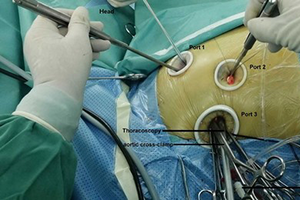Is tri-port totally thoracoscopic surgery for mitral valve replacement a feasible approach?
Abstract
Background: Minimally invasive cardiac surgery is an attractive approach for both surgeons and patients. This study aims to describe the experience of mitral valve replacement (MVR) with Ma’s tri-port totally thoracoscopic cardiac surgery technique (MTCST) and to prove the feasibility and safety of this technique.
Methods: A total of 490 consecutive patients undergoing MVR were divided into MTCST group (MT group, n=267) and conventional median sternotomy group (MS group, n=223). The perioperative characteristics and the follow-up information were recorded and analyzed between the two groups.
Results: The in-hospital mortality and re-operation rate were not significant between the two groups. Compared with the MS group, cardiopulmonary bypass time and aortic cross-clamp time were both longer in the MT group while total operative time was similar to the MS group. Patients in the MT group had less pain and required a decreased analgesic administration than that in the MS group. Intraoperative blood loss, perioperative blood transfusion and the postoperative drainage were all significantly reduced in the MT group as compared to the MS group. Mechanical ventilation time, ICU duration, hospitalization time and hospitalization cost were decreased in the MT group. Patients undergoing MVR with MTCST had a higher Medical Treatment Satisfactory Score than those with conventional sternotomy.
Conclusions: MTCST for mitral valve disease was technically safe and feasible. The results showed that MTCST was a suitable minimally invasive alternative to the conventional sternotomy approach and was a desirable approach for patients with mitral valve disease.
Cover






